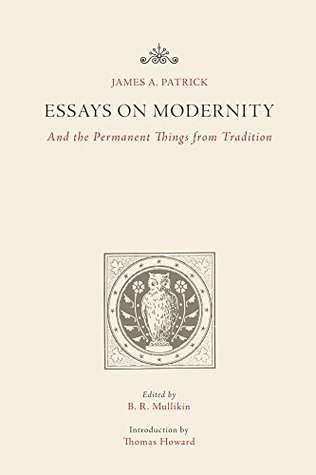I guess the misguided call it whining—the apparent conservative fixation on modern awfulness; on the disappearance of morals, manners, handwritten notes, and neckties, and the concomitant nonstop appearance of . . . shall we just leave it at H. Rodham Clinton? Thanks, I’ll do that.
The misguided require guidance into a loftier understanding of the conservative mission, which centers not on complaint but on affirmation. Complaint occurs in the context of explaining what are the good and right and proper things in life, with a view to their reclamation, their readoption when the time is right for such—as happens to be the case right now, come to think of it.
And what are those right and proper things? Chronicles readers know a thing or two about the ancient virtues. They deserve to know better the contributions of Dr. James A. Patrick to the analysis and advertisement of these virtues. This little book, a bargain at the price, full of wise reflection and gentle, temperate, almost avuncular commentary, sets up the reader for participation in the understanding of what civilization means when it means anything at all.
I know Jim Patrick; Jim Patrick is a friend of mine. He’s been author, practicing architect, Episcopal priest-turned-Roman Catholic layman, founder of a stout liberal-arts college, and, presently, daddy to an admirable community of Dallas-Fort Worth-area traditionalists, far from all of them Roman, who flock to his lectures and asseverations of the permanent things.
What the publishers of Essays on Modernity have done is bring together a collection of smart, succinct occasional pieces by Jim Patrick bearing such titles as “Christian Civilization?,” “The Precincts of Unreason,” “The End of Valor,” “More Than Latin,” “Freedom and Truth,” “Christmas in Rome,” and “Practical Advice About What to Do When the Barbarians Come.”
Patrick ranges freely among our cultural, moral, and spiritual concerns and anxieties, scattering bons mots (“In England now the principal idea is that there must be no idea, and all in the name of equality”) across deep furrows of analysis. (“[T]he fact that the government has moved from neutrality plus nods to God to aggressive godlessness, brings home to all who will see the whole tenor of history since 1300.”)
Since 1300 . . . Possibly the main lesson here is that our “crisis of civilization,” so called, neither began with the birth of Elvis nor shows much prospect of resolution via election to the presidency of Jeb Bush, or for that matter Mike Huckabee. The virtues we see as essential to the good life—honor, courage, love, faith in God, and so on—are ipso facto the perpetual targets of those with very different ideas concerning how life should be led. The affirmation of those targets, and of their desirability in human affairs, is the large duty to which Patrick sees us called. All of us—as many as can be recruited.
A gentleman and a scholar, to adopt the casual usage of modern times, Patrick sets God, and the worship of God, at the apex of human obligations. Numerous pages of Essays on Modernity are devoted to religious matters. His “Saint in a Storm,” an appraisal of Thomas More, is intelligent and reasonable—painting More as “mirror” of the discontinuity between his own times and ours—not to say more useful than the account, however popular, of the anti-Roman Catholic, pro-Cromwell Hilary Mantel in Wolf Hall.
The ground that Patrick covers in fewer than 200 pages is considerable. He takes up, for instance, Christmas carols (Christianity’s most convincing, because most loved and taken-for-granted evangelistic asset, in my view), noting how “only the Church has a song that sums up the meaning of things as it lifts up the heart.” The Christmas carol is “a gift of Jesus Christ, who makes the whole world sing, and especially at Christmas . . . ”
Without the slightest touch of malice, he makes known the Koran’s inadequacies—its “intellectual confusion, its cacophonous melding of themes recommending violence and peace, toleration of other people of the book and their extirpation, vengeance and mercy.”
His “More Than Latin” is particularly good. The language of the liturgy isn’t the main thing to keep your eye on in church. Liturgical change is just one symptom of what goes on—to wit, a struggle between opposed views concerning what a church is about. Within the Catholic Church, says Patrick, are two religions (a point, if memory serves, made by B.B. Warfield about the Northern Presbyterians a century ago). The new religion, rather than focusing on the glory of God, is all about “psychological fulfillment, making the world a kinder, gentler place.” You could liken this new religion to “religious atheism that knows nothing of the holy fear of God and that like Arianism will continue to infect and weaken.” I expect most Americans, whatever their house of holy habitation, could tell a like tale.
No, we wouldn’t call Jim Patrick an admirer of the modern world, which is why his voice makes such resonant sounds at a time we sometimes suppose would be well served by a harder line on welfare payments or the repeal and replacement of ObamaCare. Beneficial as these political additives could certainly prove, we’d still find ourselves living amid two civic religions, swapping power as preordained in our governmental relationships.
The author of Essays on Modernity takes a more spacious view:
Remember, gentle reader, that when the acquired cultural capital composed of circumstance, history, genetic inheritance, character, intelligence, and personal merit are read out of human history, all that will remain is the power of politicians and bureaucrats, armed with an unlimited power of taxation, to make a better world according to whatever theory they then hold.
[Essays on Modernity and the Permanent Things From Tradition, by James A. Patrick (Tower Press Books) 176 pp., $14.99]

Leave a Reply